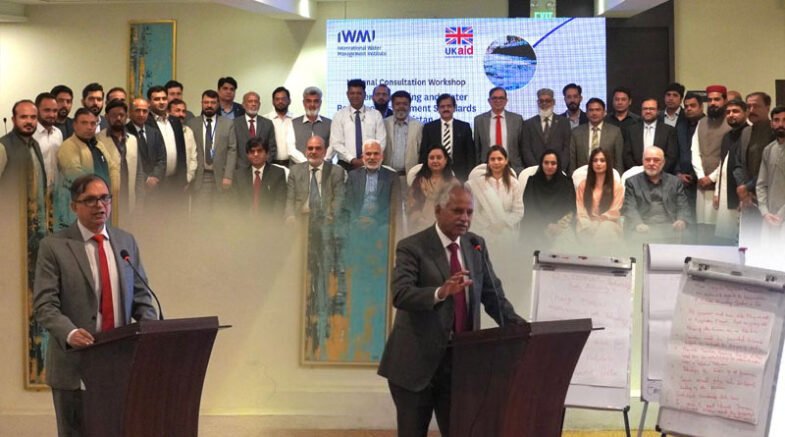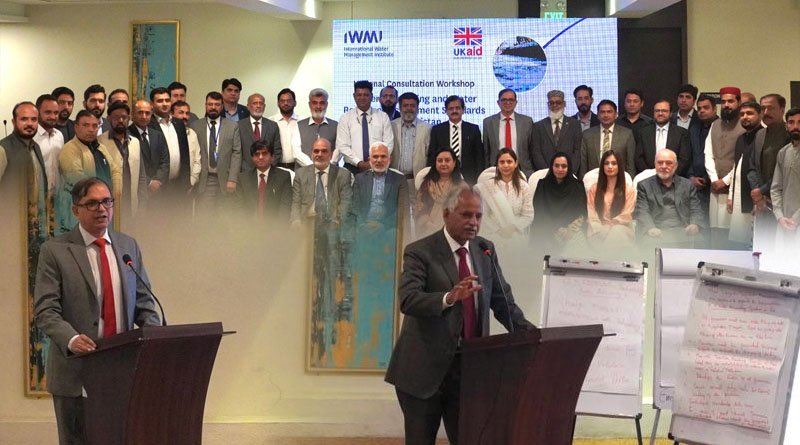Goal of workshop was to bring together key participants to debate and discuss significance of water accounting and its implications for Pakistan’s sustainable water management.

A national consultative workshop on “Water Accounting and Water Resources Assessment Standards” was organised by the International Water Management Institute (IWMI) Pakistan to aid in the implementation of the country’s national water policy (NWP).
The activity was sponsored by the Water Resource Accountability in Pakistan (WRAP) Programme Component 1: Climate Resilient Solutions for Improving Water Governance, which is funded by UK aid (CRS-IWaG).
The goal of the workshop was to bring together key participants, including representatives from the federal and provincial governments, policymakers, water experts, and practitioners, to debate and discuss the significance of water accounting and its implications for Pakistan’s sustainable water management.
IWMI’s Dr. Mohsin Hafeez welcomed the participants and announced that IWMI Pakistan had started water accounting and water resources assessment at the federal level as part of the WRAP Programme Component 1: CRS-IWaG.
According to him, IWMI Pakistan is creating national water accounting standards after consulting with all parties, including the Ministry of Water Resources (MoWR), regional organisations (Irrigation and On Farm Water Management), and academia.
The NWP’s Section 22 emphasises the need for a better water information system to support water resource planning and sustainable development in the Indus Basin to deal with climate shocks.
As stated in the statement, “IWMI Pakistan will develop water accounting standards and guidelines that should provide an agreed methodology for getting comprehensive information on water availability (surface, groundwater, and rainfall) and their associated usage (domestic, industrial, agricultural, and environmental) across the Indus Basin.”
The availability of water in Pakistan from surface water, groundwater, and rainwater sources is not well known. There is no standardised method for monitoring and measuring water resources; instead, each province has developed its own techniques.
The adoption of international standards can help develop a unified approach, that will yield accurate information regarding water availability.
Chairman of the Federal Flood Commission, Engr. Ahmad Kamal, delivered the event’s keynote address. He gave an overview of the opportunities and problems facing the management of water resources in the Indus Basin.
“Pakistan is the eighth most climate-vulnerable nation, and over the past 30 years, we have consistently been listed among the top ten. Because there is no groundwater regulatory framework and anyone can take as much groundwater as they want, Pakistan’s groundwater sources are rapidly running out,” “said Ahmad Kamal.
Dr. Umar Waqas Liaqat, Researcher Irrigation, IWMI Pakistan, gave a presentation on how to use water accounting to its fullest potential for sustainable water management in Pakistan.
He claimed that “the water accounting approach can be applied nationally. It encourages integrated water resources management, which has many advantages.”
“South Asia, Southeast Asia, and Africa are just a few of the transboundary river basins where IWMI has created and implemented a water accounting framework. The water ministries in the respective countries have used this data to identify water-saving opportunities and boost the efficacy of the managed water supplies for these river basins.”
Senior officials from Punjab, Sindh, Balochistan, Khyber Pakhtunkhwa, Gilgit Baltistan, and AJK presented on water accounts at the provincial level.
In order to get opinions on how to create a thorough national level water accounting system and build the capacity of national institutions, a focus group discussion with the participants on water accounting challenges and gaps was also organised.
In his concluding remarks, Dr. Muhammad Ashraf, the chairman of the Pakistan Council of Research in Water Resources (PCRWR), stated that, “One of the most crucial aspects of water resources is water accounting. In fact, it serves as the cornerstone of water resource management.”
“Water availability, demand, accessibility, and usage are the main determinants of all decisions. Water accounting is crucial for the fair distribution of water both within and across the sector. Provinces and various organisations are currently working on water accounting, but in separate silos. A standardised strategy should be used to integrate their efforts and enhance coordination.”
Participants in the consultation workshop included representatives from the MoWR, PCRWR, provincial departments, academia, etc.
